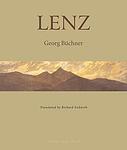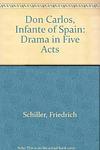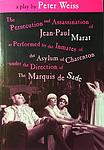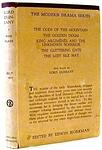The Greatest Swedish, German "Plays, Fiction" Books of All Time
Click to learn how this list is calculated.
This list represents a comprehensive and trusted collection of the greatest books. Developed through a specialized algorithm, it brings together 305 'best of' book lists to form a definitive guide to the world's most acclaimed books. For those interested in how these books are chosen, additional details can be found on the rankings page.
Genres
Plays are a category of literature that consists of written works intended for performance on stage. They typically feature dialogue between characters and are structured into acts and scenes. Plays can be comedic, tragic, or a combination of both, and often explore themes such as love, power, and morality. They are meant to be performed by actors in front of an audience, and can be enjoyed both as written works and as live performances.
Countries
Date Range
Reading Statistics
Click the button below to see how many of these books you've read!
Download
If you're interested in downloading this list as a CSV file for use in a spreadsheet application, you can easily do so by clicking the button below. Please note that to ensure a manageable file size and faster download, the CSV will include details for only the first 500 books.
Download-
1. Faust by Johann Wolfgang von Goethe
The book is a tragic play in two parts that tells the story of a scholarly man named Faust, who becomes dissatisfied with his life and makes a pact with the devil, Mephistopheles. In exchange for unlimited knowledge and worldly pleasures, Faust agrees to give his soul to Mephistopheles after death. The narrative explores themes of ambition, despair, love, and redemption, ultimately leading to Faust's salvation.
The 84th Greatest Book of All Time -
2. Mother Courage and Her Children by Bertolt Brecht
Set against the backdrop of the Thirty Years' War, the book tells the story of a canteen woman, Mother Courage, who pulls her cart with her three children across war-torn Europe. It explores her struggles and survival tactics as she tries to profit from the war while keeping her children safe. The narrative is a profound critique of war and its consequences, highlighting the human cost of conflict and the often futile search for prosperity and security in a chaotic world.
The 1731st Greatest Book of All Time -
3. The Resistible Rise of Arturo Ui by Bertolt Brecht
"The Resistible Rise of Arturo Ui" is a satirical play that uses the rise of a fictional 1930s Chicago mobster, Arturo Ui, to parallel the rise of Adolf Hitler in Nazi Germany. The narrative is a critique of those who allowed Hitler to come to power, emphasizing that his rise was indeed resistible. The play explores themes of power, corruption, manipulation, and the dangers of complacency, showcasing the destructive potential of unchecked ambition and the failure of society to prevent the ascent of dangerous individuals.
The 1735th Greatest Book of All Time -
4. Galileo by Bertolt Brecht
This play delves into the life of the renowned Italian scientist, Galileo Galilei, who challenged the church's belief in a geocentric universe. It explores his struggles against the Catholic Church, his recantation, and the consequences of his actions on his life and those around him. The narrative also examines the conflict between science and religion, the ethics of scientific discovery, and the price of truth.
The 1888th Greatest Book of All Time -
5. Spring Awakening by Frank Wedekind
The book is a provocative and controversial play that delves into the tumultuous emotional landscape of adolescence. Set in late 19th-century Germany, it follows a group of teenagers as they navigate the complexities of sexuality, authority, and rebellion. The narrative exposes the repressive and hypocritical nature of the society that stifles the natural desires and questions of the young characters, leading to tragic consequences. Through its candid exploration of themes such as sexual awakening, suicide, abortion, and the critique of the educational system, the play challenges the audience to confront the damaging effects of ignorance and the urgent need for open communication and understanding between generations.
The 2713th Greatest Book of All Time -
6. Miss Julie by August Strindberg
"Miss Julie" is a classic play that delves into the themes of class, love, and power. The story revolves around the daughter of a Count who, in a moment of passion, becomes involved with her father's valet. This scandalous affair leads to a tumultuous power struggle between the two characters, ultimately resulting in tragedy. The narrative explores the dynamics of gender and class in the late 19th century, revealing the societal constraints that lead to the characters' downfall.
The 2766th Greatest Book of All Time -
7. The Caucasian Chalk Circle by Bertolt Brecht
The play is a parable set in the Soviet Union that explores themes of justice, class struggle, and morality through the story of Grusha, a servant girl who risks her life to protect an abandoned child of noble birth during a time of revolution. As the child grows, a dispute over his custody arises, leading to a trial presided over by a wily, unconventional judge named Azdak. The trial's resolution hinges on the titular chalk circle test, which ultimately reveals the true nature of parental love and the importance of putting the needs of the child first. The narrative is a commentary on the social and political issues of the time, advocating for a society that prioritizes the welfare of its most vulnerable members.
The 2782nd Greatest Book of All Time -
8. The Father by August Strindberg
"The Father" is a dramatic play that explores the battle of the sexes through the lens of a dysfunctional family. The story centers on a military captain and his wife as they engage in a power struggle over the future of their daughter. The wife manipulates everyone around her to convince them that her husband is insane, leading to tragic consequences. The narrative delves deep into themes of gender roles, power dynamics, and the nature of truth.
The 3202nd Greatest Book of All Time -
9. The Good Person of Szechwan by Bertolt Brecht
"The Good Person of Szechwan" is a parable play that explores the difficulty of maintaining one's morals and goodness in a corrupt and exploitative world. The story revolves around a kind-hearted prostitute who struggles to be a good person under the harsh realities of life in Szechwan. When three gods visit the city in search of a good person, they find only her willing to help them. However, to survive, she must adopt a ruthless alter ego, leading to a complex exploration of morality, identity, and societal pressures.
The 3394th Greatest Book of All Time -
10. Lenz by Georg Buchner
"Lenz" is a novella that explores the mind of Jakob Michael Reinhold Lenz, a historical figure and playwright, during his descent into madness. The narrative presents a detailed account of Lenz's mental state as he struggles with depression, anxiety, and hallucinations while living in the mountains. It provides a profound look into the human psyche and the effects of isolation and mental illness.
The 3796th Greatest Book of All Time -
11. Nathan the Wise by Gotthold Ephraim Lessing
"Nathan the Wise" is a 18th-century play that explores religious tolerance and interfaith understanding. The story is set in Jerusalem during the Third Crusade and revolves around Nathan, a wealthy Jewish merchant, who is renowned for his wisdom and generosity. The narrative explores themes of religious tolerance as Nathan interacts with a Templar knight, a Christian patriarch, and the Muslim sultan Saladin. The story culminates with the revelation that the main characters, despite their different faiths, are all part of the same family, thus promoting a message of shared humanity and religious coexistence.
The 4489th Greatest Book of All Time -
12. Don Carlos: Infante of Spain, a Drama in Five Acts by Friedrich Schiller
"Don Carlos: Infante of Spain, a Drama in Five Acts" is a historical play that portrays the intense political and personal conflicts within the Spanish royal court. The story revolves around Don Carlos, the son of King Philip II of Spain, who is in love with his stepmother, Queen Elisabeth of Valois. The narrative also introduces Marquis Posa, a nobleman who advocates for freedom, and becomes a confidant to both Don Carlos and the King. The play explores themes of love, power, freedom, and betrayal, culminating in a tragic ending.
The 4490th Greatest Book of All Time -
13. The Ghost Sonata by August Strindberg
The play delves into the dark and mysterious world of a young student who, after a chance encounter, becomes entangled in the lives of the residents of a haunted house. As he becomes more involved, he is exposed to the deceit, betrayal, and moral decay that lie beneath the surface of the seemingly respectable household. The narrative unfolds through a series of surreal and ghostly events, revealing the psychological and existential struggles of the characters as they grapple with their past sins, illusions of love, and the search for redemption and truth in a world filled with secrets and specters.
The 5902nd Greatest Book of All Time -
14. Marat Sade by Peter Weiss
The play is a dramatic exploration of power, class struggle, and human suffering set within the confines of an insane asylum in 1808 France. It depicts the Marquis de Sade as an inmate directing his fellow patients in a play about the assassination of Jean-Paul Marat, a radical journalist and politician during the French Revolution. The work delves into the philosophical and political debates between Sade and Marat, representing differing views on revolution, freedom, and the nature of humanity. As the inmates perform, the line between performance and reality blurs, creating a provocative and chaotic theater experience that challenges the audience's perception of madness and reason.
The 6133rd Greatest Book of All Time -
15. Mary Stuart by Friedrich Schiller
The play delves into the tragic life of the titular character, a former queen who finds herself imprisoned and facing execution at the hands of her cousin, the reigning monarch of England. It explores themes of power, betrayal, and the struggle for sovereignty, as the protagonist confronts her impending fate with dignity and courage. The narrative unfolds through a series of intense encounters with various historical figures, each revealing the complex web of political intrigue and personal vendettas that sealed her doom. The play ultimately serves as a poignant examination of the human cost of political rivalry and the inexorable march of history.
The 6975th Greatest Book of All Time -
16. Five Plays by Heinrich von Kleist
"Five Plays" is a collection of dramatic works by a renowned German playwright, showcasing a range of themes from personal tragedy to political satire. The plays within this anthology are known for their intense emotionality, complex characters, and exploration of moral and philosophical dilemmas. The playwright's unique style combines classical forms with a sense of modernity, often leading to abrupt and surprising plot twists. The plays challenge conventional morality and social norms, reflecting the author's preoccupation with the conflicts between individual desires and societal expectations, as well as the often tragic consequences of these tensions.
The 7180th Greatest Book of All Time -
17. Egmont by Johann Wolfgang von Goethe
"Egmont" is a tragic play set in the 16th-century Spanish-occupied Netherlands, focusing on the life of a nobleman who becomes a hero among the Dutch people for his resistance against the oppressive Spanish rule. The protagonist's political and romantic involvements lead him into conflict with the Spanish authorities, culminating in his arrest and execution. Despite his tragic end, his sacrifice becomes a symbol of national resistance and inspires a successful uprising against the foreign dominators. The play explores themes of freedom, tyranny, and the personal costs of political engagement, blending historical drama with romantic elements.
The 7180th Greatest Book of All Time -
18. Verse Plays by Johann Wolfgang von Goethe
The book is a collection of dramatic works written in verse by the renowned German literary figure. These plays showcase the author's versatility and mastery in blending classical and romantic elements within the theatrical form. The content ranges from explorations of mythological themes to humanistic inquiries, all unified by the author's poetic language and philosophical depth. The plays within this compilation are celebrated for their lyrical beauty and intellectual rigor, reflecting the author's profound understanding of the human condition and his ability to translate complex ideas into compelling dramatic narratives.
The 7180th Greatest Book of All Time -
19. The Robbers by Friedrich Schiller
"The Robbers" is a dramatic tale of conflict between two aristocratic brothers, Karl and Franz Moor. Karl, the elder, is deeply idealistic but becomes an outlaw after being falsely led to believe he has lost his father's love and his inheritance due to his brother's machinations. Meanwhile, Franz, the younger brother, is a scheming villain who manipulates their father and seeks to consolidate power and wealth for himself. The play explores themes of justice, family loyalty, and the nature of good and evil as Karl leads a band of rebels against the societal corruption he despises, only to find that his quest for justice is fraught with moral ambiguity and personal tragedy.
The 7180th Greatest Book of All Time -
20. Wallenstein by Friedrich Schiller
The book is a dramatic trilogy that delves into the complex life and times of a prominent figure during the Thirty Years' War, a European conflict that spanned from 1618 to 1648. It explores the rise and fall of the titular character, a powerful and ambitious general who commands the Imperial forces of the Holy Roman Emperor. The narrative examines themes of power, loyalty, and betrayal as the general navigates the treacherous political landscape, ultimately facing a tragic downfall due to his overreaching ambition and the machinations of his enemies. The work is a rich tapestry of historical drama and personal conflict, reflecting on the nature of authority and the consequences of hubris.
The 7180th Greatest Book of All Time -
21. To Damascus by August Strindberg
"To Damascus" is a semi-autobiographical play that follows the spiritual journey of the protagonist, known as the Stranger, who embarks on a quest for meaning and redemption. Struggling with guilt, doubt, and a sense of existential despair, he encounters various symbolic characters, including the Confessor and the Lady, who represent different aspects of his psyche and philosophical challenges. The play delves into themes of faith, suffering, and the search for truth, as the Stranger's pilgrimage reflects the author's own introspective exploration of personal crisis and spiritual awakening. Set against the backdrop of turn-of-the-century Europe, the work is a complex blend of psychological drama and religious allegory, illustrating the profound inner conflicts and transformative experiences of its central figure.
The 7180th Greatest Book of All Time -
22. The Dance Of Death by August Strindberg
"The Dance of Death" is a darkly comedic play that delves into the tumultuous and decaying marriage of Edgar and Alice, an aging military captain and his wife, who are living in an isolated fortress. As they engage in psychological warfare, their toxic relationship is laid bare, revealing deep-seated resentment, bitterness, and a twisted dependency on one another. The arrival of Kurt, Alice's cousin, further intensifies the situation, as old wounds are reopened and the characters are forced to confront the reality of their lives and the destructive nature of their bond. The play is a stark exploration of marital strife, the human condition, and the intricate and often destructive dance that is human relationships.
The 7180th Greatest Book of All Time -
23. A Dream Play by August Strindberg
In the play, the audience is taken on a surreal journey through the dreamlike experiences of the daughter of a god who descends to Earth to better understand human suffering. The narrative defies conventional time and space, weaving together a series of disjointed scenes that reflect the illogical and fluid nature of dreams. The characters she encounters are trapped in their own cycles of misery, their lives marked by frustration, disappointment, and the futility of their pursuits. The dreamer navigates this shifting landscape, attempting to find meaning and compassion within the chaos, ultimately revealing the universal struggles of the human condition.
The 7180th Greatest Book of All Time -
24. Danton's Death by Georg Buchner
The play is a historical drama that delves into the tumultuous period of the French Revolution, focusing on the conflict between two revolutionary leaders. It portrays the downfall of the titular character, a once-influential figure in the revolution who finds himself at odds with the extremist factions that have risen to power. As he grapples with his eroding influence and the shifting political landscape, the protagonist is ultimately arrested, tried, and faces the guillotine. The narrative explores themes of power, idealism, corruption, and the tragic consequences of revolutionary fervor, offering a poignant commentary on the nature of political upheaval and the fate of those who find themselves on the losing side of history.
The 7180th Greatest Book of All Time -
25. The Ring Of The Nibelung by Richard Wagner
"The Ring of the Nibelung" is a monumental cycle of four epic operas that weave a complex tapestry of power, betrayal, and tragedy through the lens of Norse mythology and Germanic legend. The narrative revolves around a magical ring that grants dominion over the world, crafted by the Nibelung dwarf Alberich from gold stolen from the Rhine maidens. The saga follows the gods, heroes, and mythical creatures who battle for possession of the ring, including the chief god Wotan, the valiant hero Siegfried, and the cursed Valkyrie Brünnhilde. Themes of greed, the corrupting influence of power, and the inevitable downfall of the gods underscore a story that culminates in a cataclysmic finale, signaling the end of the old world and the dawn of a new era cleansed of the ring's curse.
The 7180th Greatest Book of All Time
Reading Statistics
Click the button below to see how many of these books you've read!
Download
If you're interested in downloading this list as a CSV file for use in a spreadsheet application, you can easily do so by clicking the button below. Please note that to ensure a manageable file size and faster download, the CSV will include details for only the first 500 books.
Download























